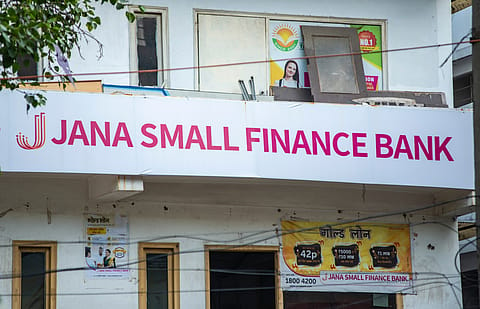Jana SFB’s universal bank bid hits pause as RBI returns application
The bank started as a small finance bank in 2017 and has fulfilled the RBI-mandated five-year operational requirement — a key eligibility criterion for SFBs aiming to become universal banks

Jana Small Finance Bank announced that the Reserve Bank of India (RBI) returned its application to voluntarily convert into a universal bank due to unmet specific criteria outlined in the regulator’s guidelines. The bank, which initially submitted its proposal in June 2025, informed the BSE on Tuesday, October 28, 2025, that the RBI’s response has been duly recorded as part of its disclosure duties.
Following the update, Jana Small Finance Bank's share was trading 2.82% lower at ₹444.85 on BSE at around 12:00 noon — below the previous close — as investors considered the delay in its upgrade ambitions.
Jana has applied to the RBI to become a universal bank under the RBI’s 2024 guidelines. This move could have placed Jana among full-service lenders like ICICI, Axis, and HDFC Bank.
The bank started as a small finance bank in 2017 and has fulfilled the RBI-mandated five-year operational requirement — a key eligibility criterion for SFBs aiming to become universal banks. This upgrade would have enabled Jana to offer a wider range of financial products, such as credit cards, foreign exchange services, and large-ticket loans — services that are currently beyond the scope of SFBs. However, the regulator pointed out some criteria were not fully met.
Under the RBI’s eligibility norms, only listed small finance banks are permitted to seek a universal bank licence. To be considered, they must fulfil several conditions, including maintaining a net worth of at least ₹1,000 crore, holding scheduled bank status, and demonstrating a solid operational history spanning at least 5 years. In addition, they need to show consistent profitability. These criteria are key benchmarks against which Jana Small Finance Bank’s performance and operations are evaluated.
On the other hand, Jana already serves over 4.6 million customers. The company has a strong Tier 1 capital adequacy ratio of 20%, higher than many other universal banks. The bank's priority-sector lending is 90%, well above the mandated 75%, demonstrating a deep commitment to financial inclusion. Affordable housing remains its largest business, employing over 3,300 staff across 185 cities.
"Many small finance banks are in a wait-and-watch mode. If they meet capital adequacy norms and are compliant, the transition to a universal bank can open significant opportunities. But it’s not an easy path—it comes with tighter regulations, improved governance, and increased scrutiny,” said Kranthi Bathini, Equity Strategist at WealthMills Securities Pvt Ltd.